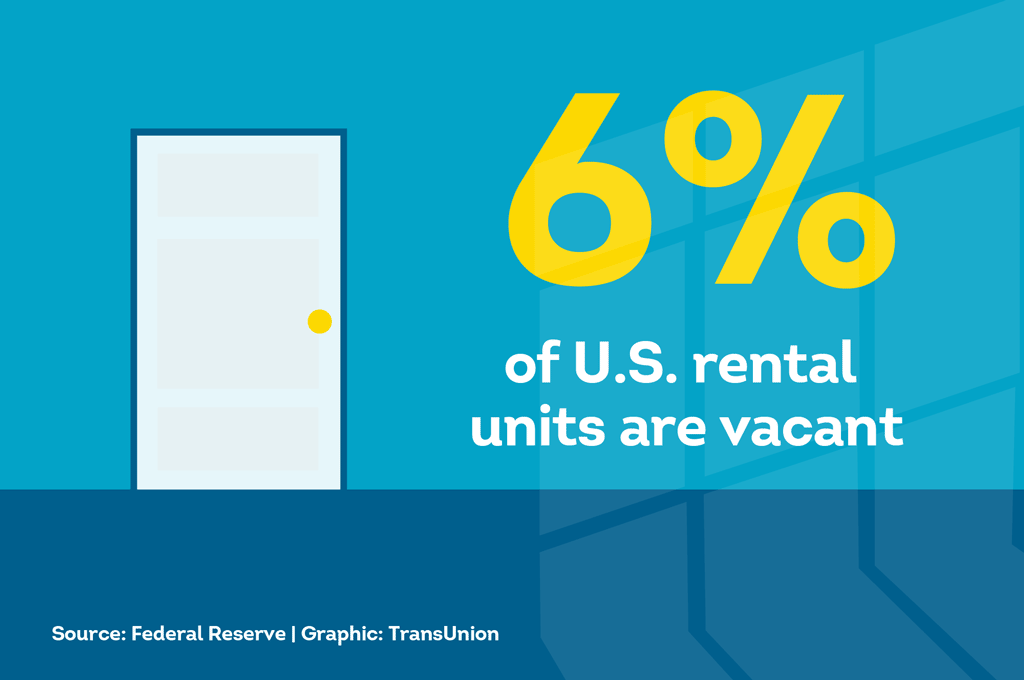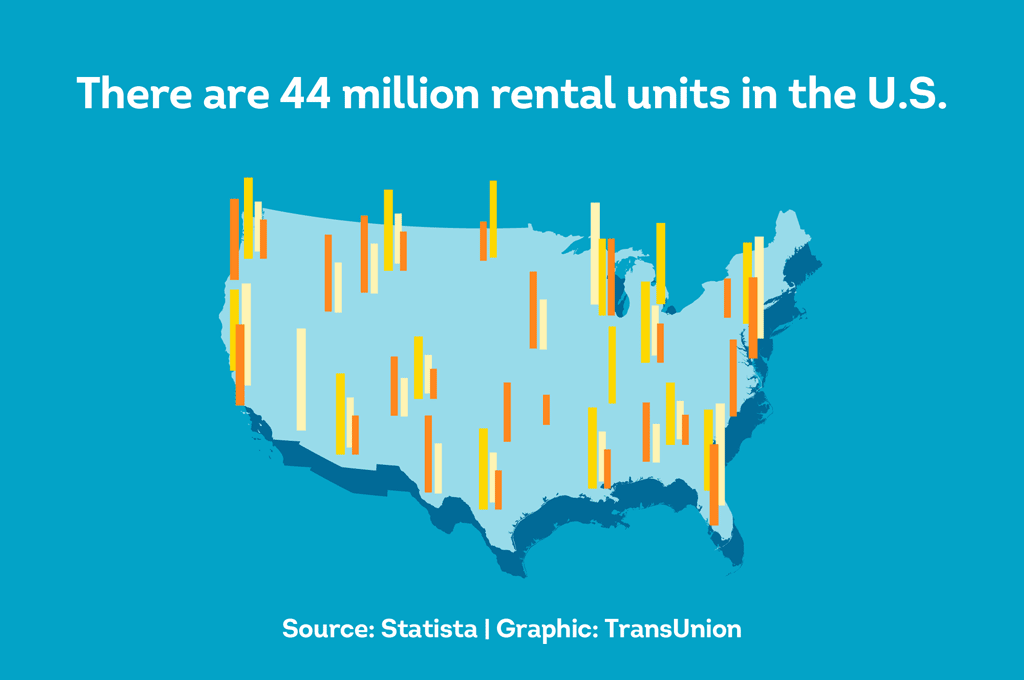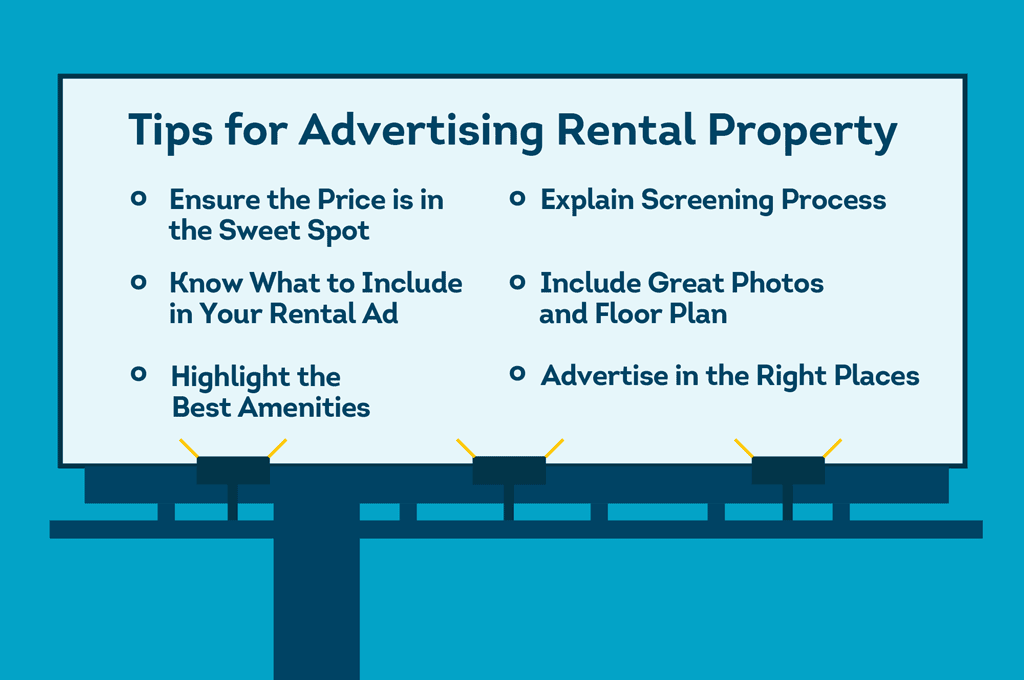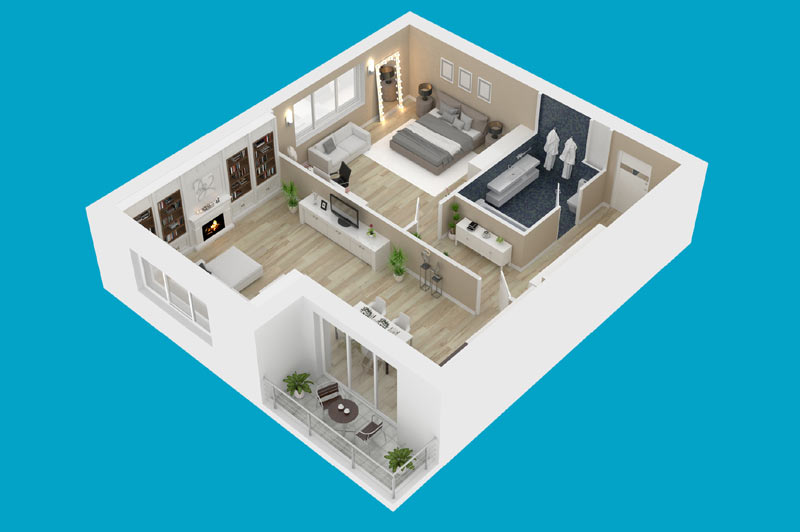Summary:
Learning how to advertise your rental property can help find high-quality renters and make money as an independent landlord. To help maximize your rental ads, make sure to do the following: set the right rental price, include the most helpful information in your ad, highlight top rental amenities, provide screening criteria upfront, use strategic photos, and know where to advertise.
Disclosure:
This content, except as otherwise indicated or stated on this site, is the property of TransUnion Rental Screening Solutions, Inc. This content is for educational purposes and for convenience only. Trademarks used are the property of their respective owners, and no endorsement or affiliation is implied. The information presented in this content is “as is” without warranties of any kind, and specifically is not represented to be complete and does not constitute legal advice, and is subject to change without notice. You are encouraged to check these terms from time to time for changes, and by accessing this site you agree to these terms and all terms listed. Laws and regulations may vary by state and locality. Consult your own counsel if you have legal questions related to your rental property practices and processes.
Disclaimer:
Remember that this material is intended to provide you with helpful information and is not to be relied upon to make decisions, nor is this material intended to be or construed as legal advice. You are encouraged to consult your legal counsel for advice on your specific business operations and responsibilities under applicable law. Trademarks used in this material are the property of their respective owners and no affiliation or endorsement is implied.
Excellent rental advertising is a lot like fishing. The perfect lure entices more fish to check out what you’re offering. However, when it comes to rental ads, the wrong bait can leave you without so much as a nibble––while all your best opportunities swim away.
According to Federal Reserve Economic Data (FRED), about 6% of rental units in the U.S. are vacant, as of Q4 in 2023. That might seem like a small number, but if you’re a landlord with a vacancy unit, you’ll almost certainly feel the heat.
Given that a vacant rental property may cost you nearly $2,000 a month, it’s critical for independent landlords to place excellent tenants in empty properties as soon as possible.
Knowing how to advertise rental property effectively is one of the best ways to cast a wide net to attract potential renters. Then, once you have a large pool of rental applicants, it’s imperative to thoroughly screen them with a reputable service like SmartMove®.
Knowing you have a set of highly-qualified potential tenants can boost the odds of success––and reduce the chance of sinking completely underwater.

The Importance of Quality Rental Advertisements
According to data site Statista, there were just over 44 million rental units in the U.S. in 2022––and that number continues to grow. Among a crowd of that size, how are you going to make your rental stand out
Knowing how to advertise your rental is key to finding top tenants and making sure your place doesn't sit empty for too long. Good ads grab the attention of renters who’d love your place and features, helping you fill vacancies faster.
Plus, when you target the right crowd, you're less likely to deal with quick tenant turnover and the costs that come with it. In short, knowing how to create quality rental advertisements may mean fewer headaches and more potential income.

How to Advertise Rental Property Most Effectively
Here are the top six things you can do to help advertise your rental property to attract quality renters.
1. Make Sure the Price is in the Sweet Spot
Don’t sabotage your advertising efforts before you even begin. You could offer the best, most beautiful apartment in the entire city. However, if your price is wrong, no one will rent it––which could mean lost income for you.
Before you start advertising, it’s essential to set a fair market rent. This means finding an appropriate rental rate that’s not too high (or too low) for your area.
To determine a good rental rate, you can look at things like:
- Location. Is the rental unit in a desirable area If so, it could increase the market value.
- Amenities and features. Perks like parking, a pool, gym, or even solar panels could mean a higher rental rate.
- Size and space. Two next-door 1br/1ba apartments might go for drastically different prices if one has more square footage than the other.
Just remember that fair market rents vary drastically depending on geographic area. It’s best to analyze your own area when looking at comparable properties.
2. Know What to Include in Your Rental Ad
These days, good rental notices go far beyond simply describing the basics of the property. Knowing how to write an effective rental ad means highlighting your property, setting expectations for rental criteria, and making sure your apartment gets picked up by search algorithms.
Describe Your Property
When writing about your property, include the information potential tenants need to make an informed decision, while also making your unit sound appealing. Some things to consider include
- Pay attention to word choice. In classic real estate speak, “charming” or “cozy” is often a codeword for “small”––and there’s a reason for that. Use attractive words that paint your apartment in a good light without going overboard.
- Provide information about the space. Include details on the type of unit, location, size, neighborhood, and amenities like parking and storage. Say if it’s furnished, recently remodeled, includes appliances, how many bedrooms/bathrooms, etc.
- Explain lease terms. In addition to the space, your ad should include information about the lease terms, such as: rental rate and payment frequency, lease length, application cost, move-in date, security deposit information, if pets or roommates are allowed, etc.
Explain Renter Criteria
Along with lease terms, including your renter qualifications directly on the ad can help you and your potential tenants save time.
Renter criteria might include information like:
- Required rent-to-income ratio
- Stable employment
- Healthy credit history
- Positive past rental references
- Acceptable criminal background check
Note that laws vary from place to place. Make sure your qualifications meet any local tenant laws and please contact your legal counsel your specific business operations and responsibilities under applicable law.
Use Search-Friendly Keywords
Now that many apartment searches are online, it’s good to write rental ads with keywords that tenants use when searching for a new home. Using quality keywords can also increase your chances of being picked up by search engines––and seen by potential tenants.
According to data from rental site RentCafe, even including the phrase “apartment homes in [your city]” can help your ad show up in more searches.
Flowery marketing language like “beautiful two bedroom condo with cozy bedrooms” may make your ad read better. However, potential rental applicants are more likely to use simple terms like “two bedroom apartments in Cincinnati” when conducting searches.
To maximize your ad’s effectiveness, it’s important to include a balance of search-friendly and marketing terms when writing your rental ads.
Pro Tip:
The timing of your rental ad can also make or break your success. Discover the best time to list your rental property to help increase the chance of getting the best tenants..
3. Highlight the Best Amenities
If you have any of the top amenities tenants want, make sure to highlight them in your rental ad. Noteworthy features include things like:
- Excellent location and proximity to services
- Reserved parking
- In-unit washer/dryer
- Included utilities or wifi
- Beautiful views
- Spacious closets
- Outdoor space like yards, patios, or balconies
- Green additions, like recycling, solar panels, and energy efficiency
- Pet-friendliness
- In-building pool, gym, or similar
- Building security, or controlled access
- Package receiving service
In your ad, you should make your unit shine––while still being honest. For example, maybe don’t say “beautiful view of the lake”, if you can only see a sliver of the lake only while standing in the far corner of the kitchen pantry.

4. Explain Screening Process
Along with providing renter criteria, you should tell your tenants what to expect in the screening process. You may want to––and may even be required by law––to give your potential applicants information about one or more of the following while advertising your rental property.
Financial Screening
To make money as an independent landlord, you should have tenants that pay rent on time, in full, and every month. Learning more about a rental applicant’s financial past can help you make more confident leasing decisions.
Financial screening could include things like:
- Tenant credit checks, including ResidentScore
- Verifying employment history
- Getting Income Insights to confirm they make what they claim on the application
Rental History
Does your tenant have a history of responsible rentals, or do they leave a trail of unpaid rent and wrecked property behind them? When writing your rental ad, you may want to mention you’ll be looking into their rental history with things like:
- Asking for a rental history
- Landlord reference checks
- Previous eviction checks
Criminal History
If your potential tenant has committed any relevant crimes that could pose a danger to you, your other renters, neighbors, or property, it’s important to know about it ahead of time. Your rental ad might mention that leasing is contingent on a successful completion of a criminal background check.
Pro Tip:
The existence of a criminal isn’t necessarily a deal breaker for landlords and renters. Learn more about the U.S. Department of Housing and Development’s guidance for criminal background checks in the rental process.
5. Include Great Photos and Floor Plan
Make it easy for potential tenants to understand and imagine themselves in your space with high-quality photos.
In fact, according to a side-by-side experiment by Canadian real estate photography site Anikio, rental ads with professional photography received twice as many views and five times more responses as listings with standard photos.
According to Zillow, some tips for better photos include:
- Have one key focal point per photo
- Use wider shots to set the scene and provide context
- Take photos during the day and use natural light, when possible
- Make sure the space is clean and tidy
- Take pictures of the same room from different angles (but don’t include too many)
- Stay honest. Edit photos sparingly
- Take outdoor shots, as well as indoor
Additionally, including even a rudimentary floorplan can make your listing seem more professional and give renters a better sense of what living there might be like.

6. Advertise in the Right Places
Once you’ve put together a quality listing, it’s time to advertise your rental property. To get the most bang for your buck, post your advertisement far and wide on different mediums. Some potential advertising outlets include:
- Posting it to the top sites to list rental property online
- Posting a “for rent” sign in the yard (include a phone number and/or QR code)
- Sharing on your personal social media accounts
- Telling your personal network about it through word-of-mouth
- Purchasing a traditional ad in a newspaper or local magazine
- Posting in local online neighborhood/city groups
SmartMove Can Help Your Rental Process
Like a perfectly dangling lure, knowing how to advertise rental property can help you reel in your next great tenant. However, if you’re not careful, you could end up netting something less savory. Help discover what’s really on the other end of your line with ultra-fast, affordable online tenant screening through SmartMove.
Great rental advertisements can generate a lot of interest, but it’s on you to determine who would be a great fit. Delve deep into your rental applicant’s past. Criminal background checks, scan nearly millions of federal and state-level records, searching for a potential match to your application. Meanwhile previous eviction checks helps you see eviction-related judgments that may be attached to your potential renter.
Does your rental applicant meet the financial criteria listed on your ad On-demand tenant credit reports help illuminate a potential renter’s financial past, while Income Insights help confirm that your applicant's self-reported income aligns with what they earn. Plus, included with every SmartMove package, ResidentScore helps predict eviction risks 15% better than traditional credit scores alone.
Designed specifically for independent landlords with only occasional screening needs, SmartMove provides easy, straightforward screening bundles at friendly prices. All reports are backed by TransUnion, a major credit agency, so you can feel more confident the information is accurate. There are no sign-up costs, subscriptions, required minimums, or hidden fees. Simply create a free account and start screen immediately.
Don’t let ill-fitting renters leave you on the hook for costly vacancies, turnover, and property damage. Help pull in better tenants with SmartMove.
SmartMove,
Great Reports. Great Convenience. Great Tenants
Know your applicant.
Additional Disclosure:
The information posted to this blog was accurate at the time it was initially published. We do not continue to guarantee the accuracy or completeness of the information provided. The information contained in the TransUnion Rental Screening Services, Inc. blog is provided for educational purposes only and does not constitute legal or financial advice. You should consult your own attorney or financial adviser regarding your particular situation. For complete details of any product mentioned, visit www.transunion.com. This site is governed by the TransUnion Rental Screening Privacy Policy Privacy Notice located at TransUnion Rental Screening Solutions, Inc. Privacy Notice | TransUnion.






